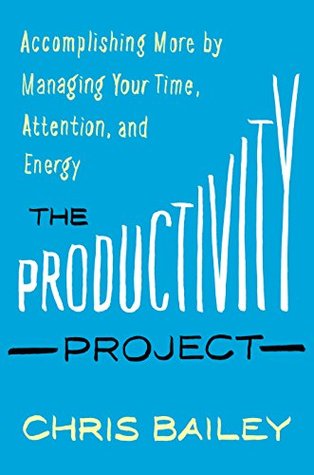More on this book
Community
Kindle Notes & Highlights
by
Chris Bailey
Read between
August 2 - September 24, 2020
productivity has nothing to do with how much you do, and everything to do with how much you accomplish.
Productivity is about how much you accomplish.
time, attention, energy—well,
to measure productivity is to ask yourself a very simple question at the end of every day: Did I get done what I intended to?
I see drinking alcohol as a way of borrowing energy from tomorrow;
drinking caffeine is a way of borrowing energy from later on in the day.
“Everyone procrastinates.” Procrastination is simply human nature.
the internet is basically the world’s largest candy store for your limbic system.
ingredients of productivity—time, attention, and energy—your
Today, time is no longer money. Productivity is money.
By controlling how much time you spend on a task, you control how much energy and attention you spend on it.
Working ninety hours a week for any longer than one week is a recipe for burnout.
common sense isn’t always common action.
The best solution I have found to shrinking mine has been to set limits, both for how much time I spend on the task, and for how often I focus on the task.
Externalizing your tasks and writing them down is a powerful way to free up mental space and get organized. Performing a “brain dump” not only reduces stress and helps you focus, it also motivates you to action.
our brains are built for solving problems, connecting dots, and forming new ideas—not
According to J.D., we have seven areas in which we invest our time (and attention and energy) every day: • Mind • Body • Emotions • Career • Finances • Relationships • Fun Ninety
when you aren’t giving your work your full focus, you simply aren’t spending your time or attention efficiently.
Productivity isn’t about doing more, faster—it’s about doing the right things, deliberately and with intention.
To be everywhere is to be nowhere. —SENECA
Busyness is no different from laziness when it doesn’t lead you to accomplish anything.
Productivity isn’t about how busy or efficient you are—it’s about how much you accomplish.
Just because you feel productive doesn’t mean you are—and the opposite is often true.
cues that trigger habits fall into one of five categories: a specific time of day, a place, a feeling, the presence of certain people, or a preceding behavior that you have ritualized.
The most productive people are the ones who work deliberately—and there is no better way to work deliberately than developing and defending a strong attention muscle.
1. Eat more unprocessed foods that take longer to digest.
Notice when you’re full, and then stop eating.
There is also something called the “glycemic index” (GI), which tracks how foods affect your glucose levels on a scale from 0 to 100. The lower a food is on the scale, the better it is for your productivity,
Exercise is worth your time.


